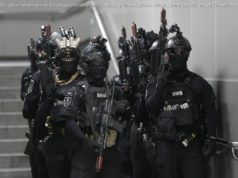North Korea’s record of broken nuclear promises goes way back
After World War II, General George C. Marshall was queried about America’s war strategy concerning the Philippines. While the US had declared it would not abandon the Islands, it did so. Marshall responded a nation’s declaratory policy often is at odds with its real policy — i.e., what it knows it must accept. He explained the United States knew it could not defend the Philippines but had to give Japan every indication it could and would.
This brings us to North Korean leader Kim Jong Un’s stated policy of denuclearization. Is it a real or declaratory policy?
In weighing Pyongyang’s recent denuclearization declarations, one must bear in mind the Koreans tend to be a patient people. So empowered, they are much more likely to focus on longer-term strategies.
South Korea has informed the United States that the North had made it known denuclearization was open to discussion. South Korean representatives claim their Northern counterparts said “there is no reason to pursue nuclear weapons so long as military threats are eliminated, and regime security is guaranteed.” After Kim made a surprise visit to China, Chinese representatives also reported that he pledged to denuclearize — in a similar vein to a (failed) pledge Kim’s father had made during a 2011 visit to China.
Pyongyang’s record of broken nuclear promises goes back to well before 2011. It violated a 1994 Framework Agreement negotiated during Bill Clinton’s presidency to freeze its nuclear program and a 2005 pledge during George W. Bush’s to abandon “all nuclear weapons and existing nuclear programs.”
A communist state family dictatorship such as North Korea has a significant advantage in negotiating arms control deals with the US. It recognizes a U. S. president has four to eight years to implement a strategy; meanwhile Pyongyang’s leader has a lifetime to do so. With Kim in his mid-thirties, he could well remain in power four to five decades more.
Thus, in the May meeting to take place between Kim and President Donald Trump, the former will pursue a delaying action strategy, biding his time for a Trump presidency to end. He knows outlasting Trump might well bring into office a president of the Barack Obama ilk—one giving Pyongyang free reign on its nuclear program.
Making Pyongyang’s declaration suspect are its claims seeking elimination of military threats and guarantees of its security. The vast majority of such military threats and actions to date have emanated from north of the DMZ. Neither the US or South Korea have aggressively sought the North’s destabilization while Pyongyang has been guilty of aggression against them through kidnappings, assassinations, terrorist attacks, etc.
China also factors into the North Korea denuclearization equation. Clearly, Beijing does not wish to see North Korea collapse, generating a unified democratic Korea on its own border and placing the US/Korean alliance at China’s doorstep.
China’s priority to keep North Korea intact was first made clear during the Korean War when its leadership threatened intervention if American forces pushed beyond the 38th Parallel. When U. S. forces did, Chinese forces responded.
The Chinese, whose control over Kim may have slipped in favor of Iranian influence, probably requested Kim meet with President Xi Jinping prior to the Trump meeting. As it was recently announced Xi is to become “president-for-life”—i.e., a lifetime dictator just like Kim—these two communist leaders will be able to map out a long-term strategy preserving their mutual goals. This, for Kim, means continuing his nuclear program.
In all likelihood, Xi suggested Kim maintain a lower nuclear and missile program profile. Both leaders undoubtedly are uneasy about Trump, neither quite sure how far he will go to stop Pyongyang. They also recognize Trump’s recent selection both of John Bolton as national security adviser and Michael Pompeo as CIA director signals a real — not a declaratory — U. S. policy effort to play hardball with Pyongyang.
Kim will have a dilemma deciding whether to accept Xi’s advice which runs contrary to Tehran’s wishes Pyongyang continue its development program — one Iran helps finance for its own benefit. Thus, China may have to provide a quid-pro-quo for Kim’s cooperation, perhaps promising him nuclear assistance at a later date, although Beijing prefers a totally denuclearized Korean peninsula.
The test for Trump will be whether he allows the North to repeat history by continuing to make false promises or whether he sets a date certain during his watch by which Pyongyang must dismantle its programs or suffer the consequences.
China may well see Korean peninsula tensions as unexpected opportunity. As its South China Sea initiative—constructing several artificial islands in violation of international law for which the Chinese now make territorial claims—China may invite the US to “Let’s Make a Deal.” As the US has aggressively challenged these claims, periodically deploying Navy ships to conduct unannounced rights of passage, China may be willing to pressure Pyongyang to take a lower profile for its nuclear program in exchange for US recognition of China’s territorial island claims.
The United States would be unwise to accept that deal. With both Beijing and Pyongyang sharing a common goal of North Korean stability and both having dictators-for-life in power to ensure it happens well after Trump leaves office, Trump would be left doing what every other US president has since the North began its nuclear program—punting the football to a future US president for resolution.
North Korea’s nuclear program must be stopped while Trump is still in office. Failure to do so leaves us playing nuclear football — with North Korea on our goal line.
Lt. Colonel James G. Zumwalt, USMC (Ret.), is a retired Marine infantry officer who served in the Vietnam War, the U. S. invasion of Panama and the first Gulf War.
The views and opinions expressed in this commentary are those of the author and do not reflect the official position of The Daily Caller.






